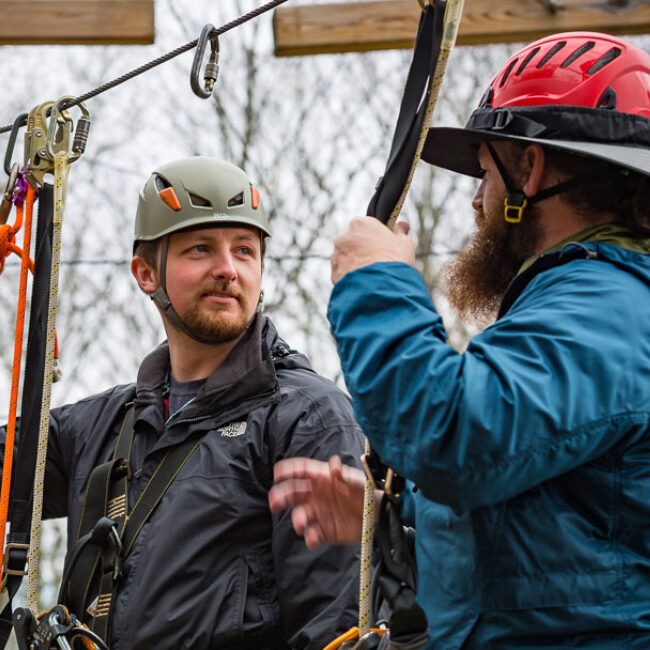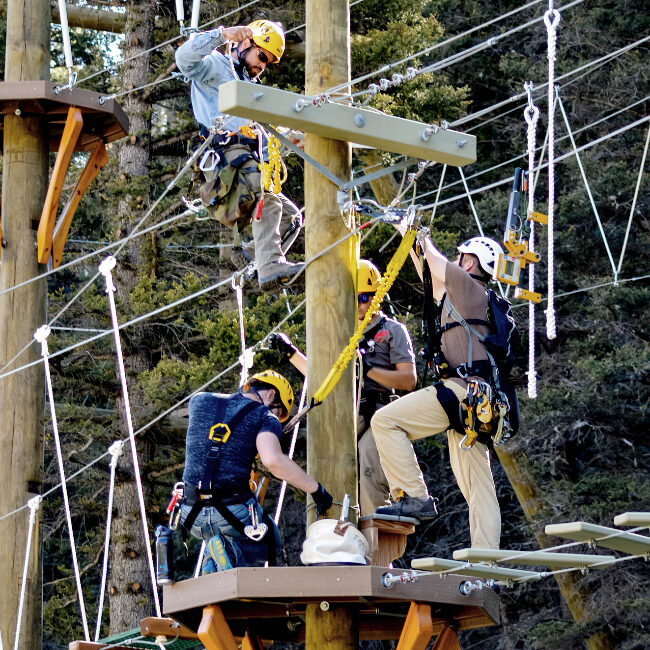Tailored Training

Train your operations team using your equipment at your facility. We work with you to identify facility-specific training objectives that reflect your operating procedures and current industry standards. Our trainers travel to your site and deliver hands-on training for a small team or your entire staff, assessing skills and providing feedback on each individual.
Blended Learning

Advanced Skills

Never stop learning. Advanced professionals need advanced training. From facility inspection and maintenance fundamentals to advanced rope access and rescue, Challenge Towers trainers can help you and your team develop a wide range of advanced skills that better support your operational needs.
Ready to get started?
Drop us a line today to get a quote and confirm your training dates!
Frequently Asked Questions
Q: How much does the training cost?
Each training service is tailored to individual needs, and the cost is determined based on various factors. Our team reviews documents such as inspection reports, staff manuals, and LOPs to estimate the duration and content of the training. Together, we'll discuss these aspects to ensure the training aligns with your objectives and meets the necessary training hour standards.
Q: What additional expenses should I expect from training?
Below is an overview of potential travel expenses. We invoice these exactly as incurred and strive to maintain reasonable costs:
Driving: mileage at the prevailing national rate, rental car and fuel, road tolls Flights: airfare, baggage fees, airport parking Meals: a daily rate per trainer; lodging - billed as incurred with an average estimate available Travel labor: fees vary based on a full or half day of travel ** Travel expenses can be reduced if clients can provide accommodation, meals, transportation, etc., which align with the trainer's needs and adhere to recommended health protocols.
Q: How many participants can we have at the training?
We can accommodate your staff requirements, maintaining a ratio of 5-10 trainees per trainer, depending on the specific site. For certification testing, an additional day is required, with a maximum ratio of 5 candidates per trainer/tester.
Q: Do you train on courses that Challenge Towers did not build?
Absolutely! According to ANSI/ACCT standards, training should occur on a course that has received a passing inspection (course and equipment) by a competent third party within the past year.
Q: Can you certify our staff to be trainers?
Currently, there isn't an ACCT-backed certification for this purpose. The ANSI/ACCT 3-2019 Standards state that only a Qualified Person can provide training. A Qualified Person has verified expertise in various aspects of the subject. Please review the Qualified Course Professional Guidelines for more details.
Q: What differentiates certification from non-certification track training?
Essentially, the difference lies in skills verification. Certification track training concludes with both a written and practical examination to validate skills and achieve Challenge Towers certification. Only an ACCT-accredited Professional Vendor Member for Training/Certification can grant practitioner certifications recognized by the ACCT.
Q: Is it mandatory for my staff to be certified?
It's conditional. Several factors, including regional regulations, accreditation program criteria, and insurance company stipulations, might necessitate training or certification. While annual training from a qualified individual is a common industry practice and standard, the decision to certify is organization-specific. We're here to assist in making an informed choice.
Q: How long is the certification valid?
Level 1 practitioner certification is valid for 1 year. Level 2 lasts for 3 years, and a Course Manager certification remains valid for 5 years.
